Related Research Articles

The 1930 FIFA World Cup was the inaugural FIFA World Cup, the world championship for men's national football teams. It took place in Uruguay from 13 to 30 July 1930. FIFA, football's international governing body, selected Uruguay as the host nation, as the country would be celebrating the centenary of its first constitution and the Uruguay national football team had successfully retained their football title at the 1928 Summer Olympics. All matches were played in the Uruguayan capital, Montevideo, the majority at the Estadio Centenario, which was built for the tournament.

Club Atlético Peñarol, more commonly referred to as Peñarol and also known as Carboneros, Aurinegros, and (familiarly) Manyas, is a Uruguayan sports club based in Montevideo. The name "Peñarol" comes from the Peñarol neighbourhood on the outskirts of Montevideo. Throughout its history the club has also participated in other sports, such as basketball and cycling. Its focus has always been on football, a sport in which the club excels, having never been relegated from the top division. The club traditionally plays in yellow and black-striped shirts.
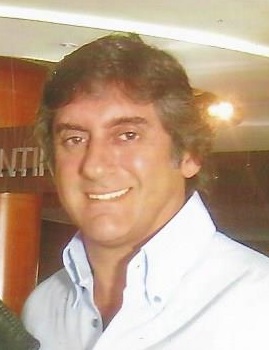
Enzo Francescoli Uriarte, nicknamed "El Príncipe", is a Uruguayan former footballer who played as an attacking midfielder. He is regarded as one of the best playmakers of his generation and as one of Uruguay's and South America's greatest ever players. He represented his nation at two FIFA World Cups, in 1986 and 1990, also winning the Copa América in 1983, 1987 and [[Copa Amérisaca 1995|1995]].
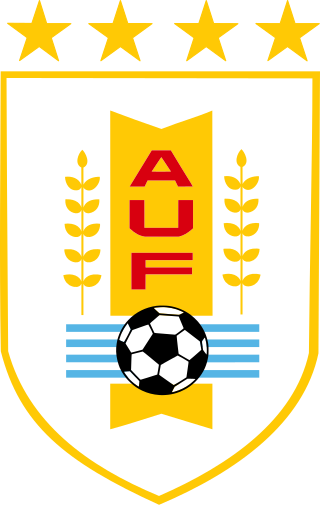
The Uruguay national football team represents Uruguay in international men's football, and is administered by the Uruguayan Football Association, the governing body for football in Uruguay. The national team is commonly referred to as La Celeste.

The Colombia national football team represents Colombia in men's international football and is managed by the Colombian Football Federation, the governing body for football in Colombia. They are a member of CONMEBOL and are currently ranked 14th in the FIFA World Rankings. The team are nicknamed Los Cafeteros due to the coffee production in their country. The national team has been a symbol of nationalism, pride and passion for many Colombians worldwide. Colombia is known for having a passionate fan base, and the team's dances during goal celebrations have been symbolic.
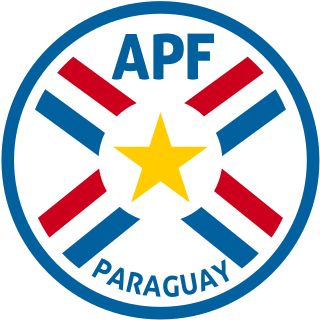
The Paraguay national football team represents Paraguay in men's international football competitions, and are controlled by the Paraguayan Football Association. Paraguay is a member of CONMEBOL. Their nickname is the Albirroja, or red and white. The Albirroja has qualified for eight FIFA World Cup competitions, with their best performance coming in 2010 when they reached the quarter-finals. A regular participant at the Copa América, Paraguay have been crowned champions of the competition on two occasions. Paraguay's highest FIFA World Rankings was 8th and their lowest was 103. Paraguay was awarded second place with Best Move of the Year in 1996 for their rise in the FIFA Rankings.

Asociación Deportivo Cali, best known as Deportivo Cali, is a Colombian sports club based in Cali, most notable for its football team, which currently competes in the Categoría Primera A.
Roberto Eladio Fernández Roa, also known as Gato Fernández, is a retired football goalkeeper from Paraguay. He was capped 78 times for the Paraguay national football team in an international career that lasted from 1976 to 1989. He was also a member of the Paraguayan team that won the 1979 Copa América. He earned the nickname "El Gato" for his outstanding stretching saves.

Estadio Metropolitano Roberto Meléndez, commonly known as Estadio Metropolitano, or colloquially, El Metro, is a multi-use all-seater football stadium in Barranquilla, Colombia. It is the home stadium of local football team Atlético Junior. It was built with a capacity of 46,788 for the Colombian World Cup bid in 1986. The stadium was inaugurated that year with a game between Uruguay and Junior, which the Uruguayans won 2–1. It is the largest stadium in Colombia, after the Estadio Deportivo Cali's renovation. The first official name of the stadium was Estadio Metropolitano, which was changed around 1991 in order to honor the Colombian footballer Roberto Meléndez. This is the official stadium for the national football team of Colombia.
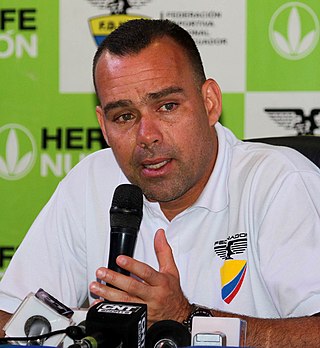
Rafael Édgar Dudamel Ochoa, is a Venezuelan football manager and former player who played as a goalkeeper. He is the current manager of Colombian club Atlético Bucaramanga.

Alberto Horacio Suppici was a Uruguayan footballer and coach who won the first ever FIFA World Cup, leading the Uruguay team in the 1930 tournament on home soil. Suppici is known as el Profesor. His cousin was the professional driver Héctor Suppici Sedes.

Jorge Orosmán da Silva Echeverrito is a Uruguayan football coach and a former player who played as a striker. He is the manager of Colombian club América de Cali.

Óscar Washington Tabárez Silva, known as El Maestro, is a Uruguayan former professional football manager and former player.
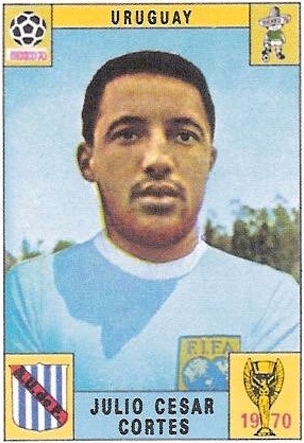
Julio César "El Pocho" Cortés Lagos is an Uruguayan football coach and former midfielder who participated in three World Cups with the Uruguay national team.

Juan Guillermo Castillo Iriart is a Uruguayan football coach and former player who played as a goalkeeper. He is the current goalkeeping coach of Rampla Juniors.

Jorge Luis Pinto Afanador is a Colombian football manager.
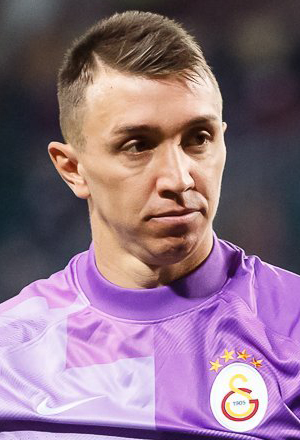
Néstor Fernando Muslera Micol is a Uruguayan professional footballer who plays as a goalkeeper for and captains Süper Lig club Galatasaray.
Washington Alexis Viera Barreto, commonly known as Alexis Viera, is a retired Uruguayan footballer who played as a goalkeeper. He holds Italian citizenship. Currently, he is assistant coach of his last club Atlético F.C..

Nine of ten members of the South American Football Confederation (CONMEBOL) have competed in the men's FIFA World Cup finals. National association football teams from CONMEBOL have won the tournament ten times, including Brazil's record five championships. CONMEBOL countries have hosted the finals five times.

At the 1970 FIFA World Cup, Brazil participated for the 9th time in the event. The country remained as the only national team to have participated in every installment of the FIFA World Cup. The 1970 Brazil line-up is often considered to be the greatest football team in history.
References
- ↑ "Uruguay - International Matches 1991-1995". Archived from the original on 2010-07-23. Retrieved 2013-06-24.